
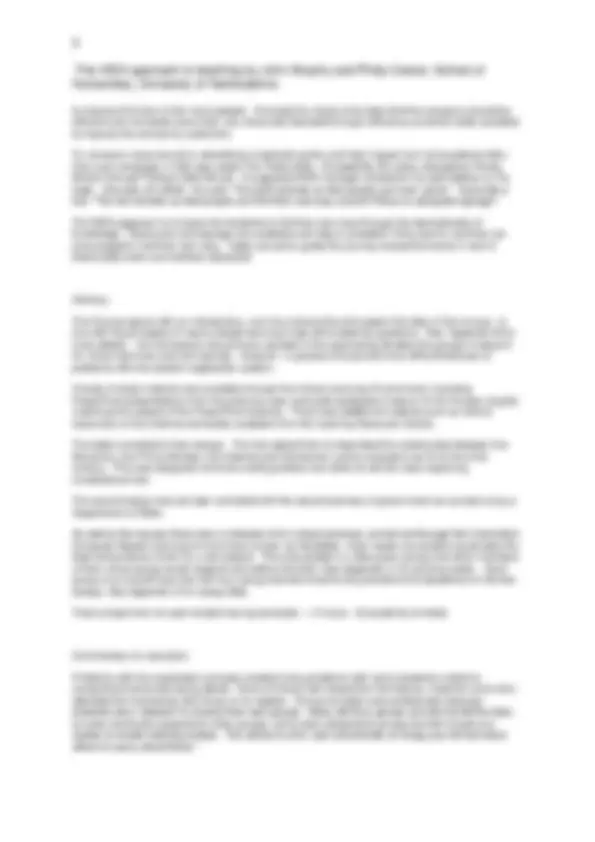
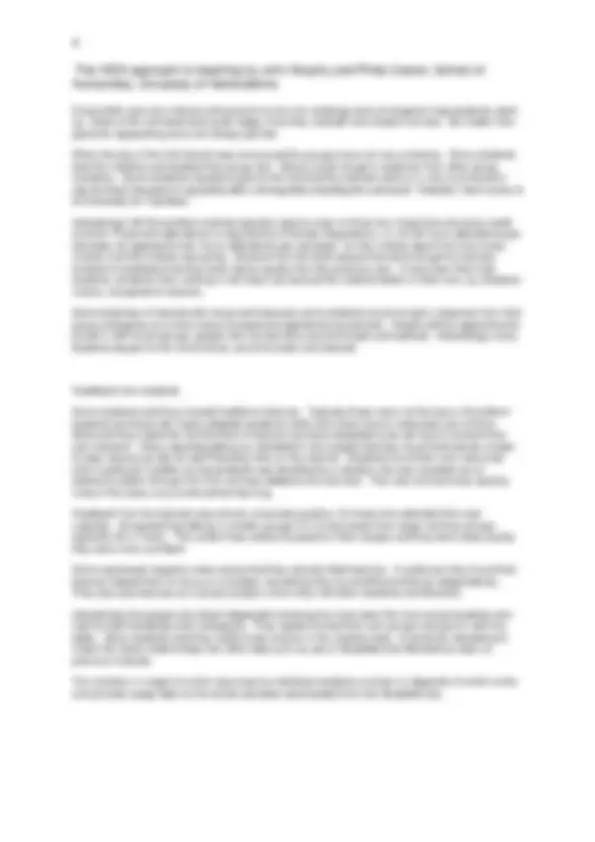
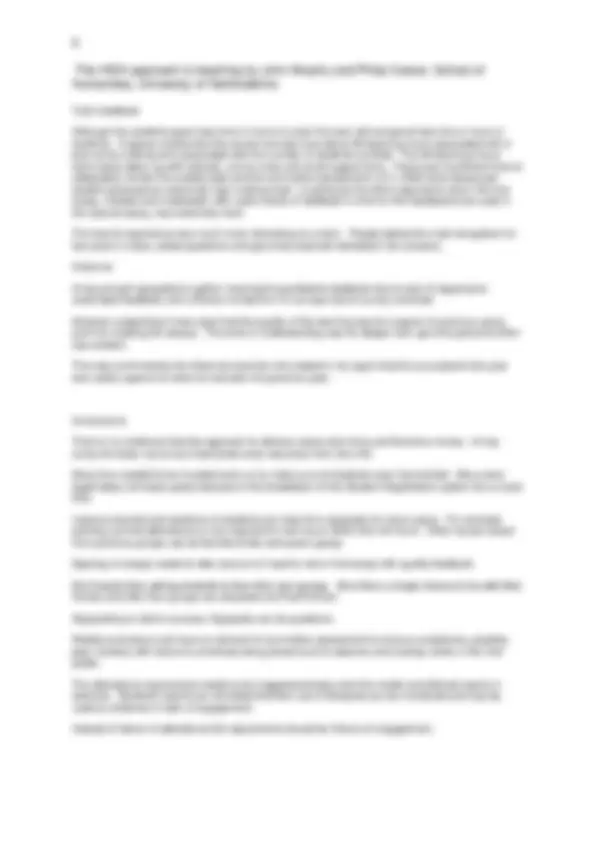
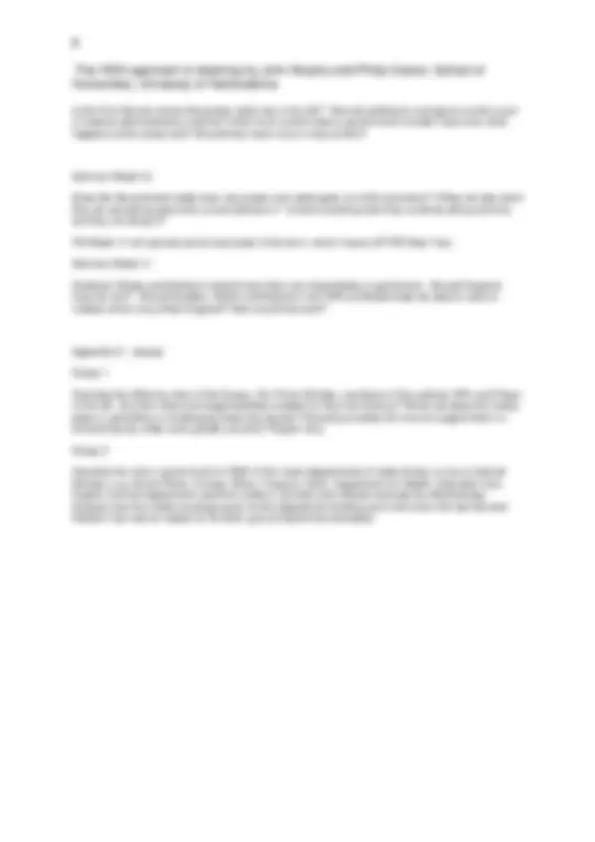
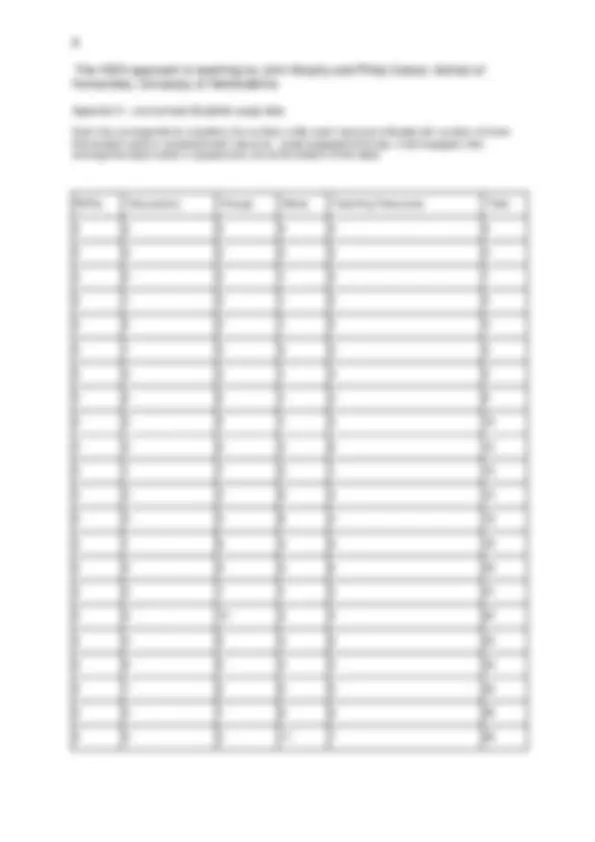
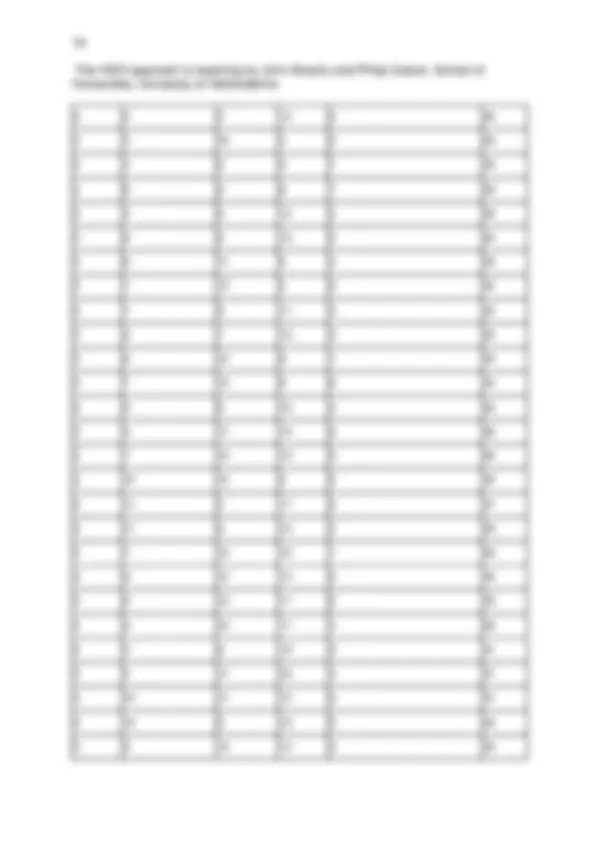


Study with the several resources on Docsity

Earn points by helping other students or get them with a premium plan


Prepare for your exams
Study with the several resources on Docsity

Earn points to download
Earn points by helping other students or get them with a premium plan
Community
Ask the community for help and clear up your study doubts
Discover the best universities in your country according to Docsity users
Free resources
Download our free guides on studying techniques, anxiety management strategies, and thesis advice from Docsity tutors
This document, authored by John Murphy and Philip Cowan from the School of Humanities at the University of Hertfordshire, discusses the shift towards students as consumers in higher education and the need for universities to provide value for money. The authors describe an attempt to improve student engagement in a journalism course by abandoning conventional lectures and seminars in favor of an Inquiry Based Learning approach. Students were found to be happier and more engaged with the process of inquiry, leading to better academic performance. The document also touches upon the challenges of implementing this approach, such as group formation and student attendance.
What you will learn
Typology: Exams
1 / 12

This page cannot be seen from the preview
Don't miss anything!







Abstract
The large increase in UK higher education tuition fees is expected to lead to more emphasis on students as consumers. Jones (2010) has already described the gap between expectations and deliverable in Higher education and the need for each university to provide detailed metrics on teaching provision, most notably contact hours.(QAA, 2011)
Contact hours may be seen as a measure of Value for Money, however the authors report that in some contexts less may be more. The quality rather than the quantity of the contact may be more important.
The Authors describe an attempt to improve the engagement of students in a course. As a last resort the conventional lecture and seminar approach, involving 24 formal contact hours, was abandoned in favour of an Inquiry Based Learning approach supported by online materials and just two hours of formal contact time for each student.
By moving responsibility for learning onto the student the resultant learning was greatly improved. Students were happy to engage with the process of inquiry, with the acquisition of the required “body of knowledge” coming to them naturally as they researched. Tutors were there to support, explain, give pointers and directions to sources as well as to facilitate shared discovery of resources. While a few students missed the social quality of lectures a similar small number resented having to come into the University just for those two hours.
Background
US academics have been more assiduous in tracking the changes in student behaviour, and it is to American academic studies we look to get a picture of our own university culture.
Perhaps due to the need to take on paid work, the distractions of a ‘media saturated world’, a side effect of extending higher education, or simply a shift in cultural attitudes, but time spent by students on independent study has about halved over the past four to five decades (Babcock and Marks, 2010). This is compounded by a general decline in reading by young people (Jacobs, 2007) and indeed a worrying lack of cognitive development following four years of American college life (Arum & Roksa, 2011).
While many students may regard the achievement of a degree as the passport to an improved income, it could be that independent reading and study is more important in extracting the greatest benefit from their time spent attending an institution. A large proportion of students are graduating from American universities with little or no cognitive development — but the degree certificate is not saving them from the challenges of the job market. Indeed, it is those students who perform best in cognitive tests who go on the ensure they remain off the unemployment statistics (Arum, Cho, Kim & Roksa, 2012)
There is no reason to doubt that a similar picture has developed in the UK. If so, encouraging students to study independently is far better for them than insisting that they attend lectures and seminars with some reluctance and little engagement.
Inquiry based learning has been used in many forms and is supported by theorists going back to Dewey (Dewey, 1938) and Freire (Freire and Freire, 2004). It has become common in Science and medicine and is encroaching into Social Sciences and Humanities. It should be quite natural for journalism students to acquire knowledge by research and inquiry.
The Problem
While delivering the third year module , Journalism, Government and the People in a traditional lecture/seminar format, it was evident that there was a lack of engagement by a large proportion of the students. Attendance requirements set by University Regulations led to seminar groups of around 25 being characterised by minimal group discussion just there to sign the register and go home. Measures to break them into small groups, provide handouts with exercises, reading requirements to be discussed in the following seminar all had limited success. Indeed, the few who did want to speak found their behaviour to be abnormal to group norm and were soon silenced by the silence around them.
It seemed self-evident that the students needed to be required to engage with the subject matter and the tutor’s presence and efforts were having only a minimal effect.
A radically different teaching scheme was devised for the next year which would require the students to read the subject matter and discuss it with each other. The prime purpose of this was to ensure they finished the module having learnt much more about the subject matter than they would have done under the traditional methodology of lecture/seminar. The Lectures would be effectively replaced with online postings of PowerPoint slides together with informal audio lectures downloadable from the Virtual Learning Environment.
A Scheme of group online working was devised so that group discussions were seeded by one students and followed up by the others, each taking in turns to lead.
Circumstances adding extra risks.
To make life more complicated the module leader became seriously ill on the first day of term. Another teacher familiar with the core material took over and delivered what he was presented with, trying to make it work.
At the same time an upgrade of the student record system made it impossible to obtain full lists of students and some had difficulties with some sections of the online material. But the open access approach to teaching materials meant that everything was visible to students whether they were registered or not, except assignment submission.
Appendix A Contains the detailed Programme of Study
Why IKEA?
This well known furniture retailing company was founded by Ingvar Kamperad, who had very strong views about how his company should be run. In 1976 he wrote these thoughts down in a document he called “ The Testament of a furniture dealer ” (Kamperad, 2007). In this he said that IKEA aim was
Email traffic was very intense and several one-to-one meetings were arranged to help students catch up. Most of the confused were quite happy once they realised how simple it all was. No matter how good the signposting some will always get lost.
When the day of the first tutorial was announced the groups were not very cohesive. Some students took the initiative and booked their group slot. Others could not get a response from other group members. Some students reacted angrily to the fact that the tutorials were on a very inconvenient day for them (because it coincided with a driving test) including the comment: “Actually I don’t come in to University on Tuesdays.”
Interestingly UH Humanities modules typically require a two or three hour fixed time slot every week at which 75 percent attendance is required by University Regulations, i.e. 24-36 hours attendance per semester as opposed to two hours attendance per semester for this module.Apart from this it was unclear how the module was going. However the first draft essays that were brought to tutorials showed immediately that they were higher quality than the previous year. It was clear that most students, whatever their ranking in the class has learned the material better on their own, by whatever means, compared to lectures.
Some bookings of tutorials did not go well because some students could not get a response from their group colleagues so a fairly loose arrangement applied during tutorials. People without appointments joined in with small groups, people who arrived early sat at the back and listened. Interestingly many students stayed for the next tutorial, sat at the back and listened.
Feedback from students
Some students said they missed traditional lectures. Typically these were not the top or the bottom students but those with highly adapted academic skills who knew how to make best use of them. Most said they hated the confinement of lectures and were delighted to be set free to conduct their own research. Many reported getting so interested in the subject that they found themselves unable to stop, staying up late at night following links on the internet. Students found their own resources and in particular a better course textbook was identified by a student, this was available as an electronic edition through the VLE and was added to the core text. This new core text was used by most of the class, truly constructivist learning.
Feedback from the tutorials was almost universally positive, for those who attended (the vast majority). All agreed that talking in smaller groups of 3-8 was easier than larger seminar groups (typically 20 or more). The content was clearly focussed on their essays and they went away saying they were more confident.
Some expressed negative views saying that they actually liked lectures. In particular they found that lectures helped them to focus on a subject, something they found difficult working independently. They also saw lectures as a social occasion when they met other students and teachers.
Interestingly the people who liked independent working the most were the more social students who had formed friendships with colleagues. They rapidly formed their own groups and got on with the tasks. Many students said they hardly knew anyone in the module class. It would be interesting to match the social relationships into other data such as use of StudyNet and Attendance rates on previous modules.
The variation in usage of online resources by individual students is shown in Appendix E which is the anonymised usage data for the whole semester downloaded from the StudyNet site.
Tutor feedback
Although the students spent less time in front of a tutor the tutor did not spend less time in front of students. A typical module like this would normally have about 36 teaching hours associated with it plus some marking time associated with the number of students enrolled. The 36 teaching hours were easily taken up with tutorials, one-to-ones and email support time. There was insufficient time to adequately monitor the weekly task and the summative assessment of 2 x 2000 word essays per student produced an extremely high marking load. In particular the effort required to return the first essay, marked and moderated, with useful levels of feedback in time for this feedback to be used in the second essay, was extremely hard.
The tutorial experience was much more interesting as a tutor. People talked who had not spoken for two years in class, asked questions and genuinely seemed interested i the answers.
Outcome
It has proved impossible to gather meaningful quantitative feedback due to lack of response to automated feedback and a School moratorium on surveys due to survey overload.
However subjectively it was clear that the quality of the learning was far superior to previous years just from reading the essays. The level of understanding was far deeper and genuine personal effort was evident.
This was confirmed by the External examiner who stated in his report that the coursework this year was vastly superior to what he had seen the previous year.
Conclusions
There is no evidence that this approach to delivery saves tutor time and therefore money. It may consume fewer rooms but it demands extra resources from the LRC
More time needed to be invested early on to make sure all students were fully briefed. Many were legitimately confused, partly because of the breakdown of the Student Registration system at a crucial time.
Lessons learned and reactions of students can help form signposts for future years. For example pointing out that attendance is only required for two hours rather than 24 hours. Other issues raised from previous groups can be fed into to the next year’s group.
Spacing of essays needs to take account of need to return first essay with quality feedback
Don’t waste time asking students to form their own groups. Give them a single chance to be with their friends and after than groups are allocated and fixed forever.
Signposting is vital to success. Signposts can be questions.
Weekly exercises must have an element of summative assessment to ensure compliance, possibly peer marked, with failure to contribute being tantamount to absence and costing marks in the final grade.
The attendance requirement needs to be mapped precisely onto this model and defined clearly in advance. Students need to be reminded that their use of Studynet can be monitored and may be used as evidence of lack of engagement.
Instead of failure of attendance the requirement should be Failure of engagement.
The class was asked some basic questions about the UK constitution.
Tutor: “If a policeman stops you in the street, by what authority does he do so?”
Class: Blank faces. “don’t know”.
Tutor: “So why do you stop then? tell him to push off and be on your way.”
Class: Blank faces. Eventually someone figures it out “force of arms, he has a taser and cs spray.”,
Tutor: “correct, but what gives him the authority to use them?”
Class: Don’t Know.
Tutor: “The Queen”
Class: “What!”
Class: “yes but isn’t it really consent, we all kinda agree to it because we want to police to keep the streets safe?”
Tutor: “Yes, the Queen is in fact the commander in chief of the armed forces and the police are Her Majesty’s Constables. She and her troops have all the guns so they keep the streets safe and stop the country being invaded. And that is the situation in the 21st century.”
Tutor: “Did you know there is no such office as Prime Minister?”
“David Cameron gets his salary for being First Lord of the Treasury, there is no law anywhere which says what the powers of the prime minister are, how they are appointed or even how to get rid of one. The office does not exist.”
A few more constitutional conundrums start to encourage the idea that this module could be interesting.
Appendix C
These seminars must be done in the following order, please discuss them as a team and if you cannot agree who does what then draw lots. Do not ask me to decide.
Seminar Week 4:
Firstly consider whether the media gives readers a fair impression of the political issues and the process, secondly whether the government and opposition politicians are fair and honest in their dealings with the press. What would you change? Why, what is wrong with the current system?
Seminar Week 5
Are elections to Westminster done using a fair system? Or is the system used for the Scottish Parliament at Holyrood better? If so why? Do elections make any difference, in which case why do so many young people not vote?
Seminar Week 7
Would be benefit from having a fully written Constitution like many countries, e.g. US, France, have or is it better just to leave things as they are?
Seminar Week 8
Is the Civil Service where the power really lies in the UK? How do politicians manage to control such a massive administrative machine? How much control does a government minister have over what happens at the sharp end? Should they have more or less control?
Seminar Week 10
Does the Government really have any power over what goes on in the economy? If they do why don’t they do something about the current downturn? Is there anything else they could be doing and why are they not doing it?
PS Week 11 will actually be the last week of the term, which means AFTER New Year
Seminar Week 11
Scotland, Wales and Northern Ireland have their own Assemblies or parliament. Should England have its own? Should Scottish, Welsh and Northern Irish MPs at Westminster be able to vote on matters which only affect England? How would that work?
Appendix D - essays
Essay 1
Describe the differing roles of the Queen, the Prime Minister, members of the cabinet, MPs and Peers in the UK. Are their roles and responsibilities suitable for the 21st Century? What role does the media plays in upholding or challenging these key figures? Should journalists do more to support them or should they be under even greater scrutiny? Explain why.
Essay 2
Describe the role in government of ONE of the major departments of state (those run by a Cabinet Minister, e.g. Home Office, Foreign Office, Treasury, MoD, Department for Health, Education etc). Explain how the department uses the media in its work and critically evaluate its effectiveness. Analyse how the media coverage given to this department leading up to and since the last General Election has had an impact on its work, give at least three examples.
Total 373 528 617 348 1866
Table of usage of StudyNet resources. Each line represents a student registered on the course. It indicated the total number of usages of resources by resource and in total on the far right. Most engaged students at the bottom o f the table, least engaged at the top. This information was use by the Module Board to help determine lack of engagement.
Bibliography
Arum, R. & Roksa, J. Academically Adrift: Limited Learning on College Campuses, University of Chicago Press, Chicago, USA (2011).
Arum, R., Cho, E., Kim, J., Roksa, J. Documenting Uncertain Times: Post-graduate Transitions of the Academically Adrift Cohort, SSRC (2012).
Babcock, P. & Marks, M. The Falling Time Cost of College: Evidence from Half a Century of Time Use Data , National Bureau of Economic Research, Cambridge, Massachusetts, USA (2010).